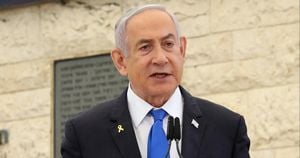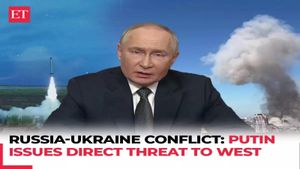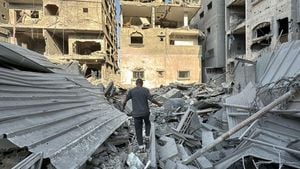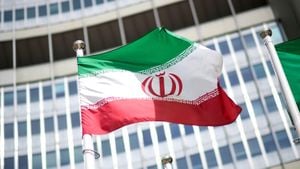Professors across the United States are finding themselves ensnared in growing disciplinary actions surrounding their expressions of support for the Palestinian cause amid the backdrop of the recent conflict between Israel and Hamas. A wave of investigations and consequences faced by educators highlights the potential chilling effect on academic freedom, as many faculty members claim they are increasingly unable to express their views without fear of reprisal.
Take, for example, Maura Finkelstein, who until recently was an associate professor of anthropology at Muhlenberg College. Known for her vocal online presence, Finkelstein found herself at the center of controversy when she characterized fundraising efforts for Israel's military actions as "students raising money for genocide." This social media activity sparked complaints, triggering investigations from both federal civil rights authorities and the college itself. Her ultimate dismissal came not just from these statements but particularly from her sharing of content deemed harmful by students; one post by Palestinian American poet Remi Kanazi, which admonished others not to cower to Zionists, led her to be fired.
Finkelstein's story is not isolated. Reports indicate rising disciplinary actions against professors, with 145 such incidents reported last year compared to just four two decades prior, according to the Foundation for Individual Rights and Expression. The increase reflects not only changes within academia but also societal shifts where the polarized views on the Israeli-Palestinian conflict increasingly permeate campus life.
This increasing atmosphere of caution has left many educators pondering whether academic freedom is genuinely under threat. Peter Lake, director of the Center for Excellence in Higher Education Law and Policy at Stetson University, noted the current vibe: "There’s a chill in the air." Faculty members are openly discussing how the cultural climate surrounding these protests is impacting the way they engage with students and express their views, particularly around divisive issues.
It’s important to clarify here how these issues interact with ideas around student safety, which university administrations argue they are prioritizing. Many Jewish students have reported feeling unsafe, fearing repercussions should they openly express their perspectives—often causing them to self-censor within both classroom discussions and protests. Nadine Strossen, former president of the American Civil Liberties Union, remarked on the limits of academic freedom, stating, "It does not protect 'propagandizing wrongheaded ideas' nor does it put faculty above campus rules meant to keep learning from being disrupted."
Yet, this emphasis on creating safe spaces doesn't translate uniformly across the board. Finkelstein argues her firing reflects underlying antisemitism within her institution rather than any harmful conduct on her part. "I thought being Jewish would protect me, and it didn’t," Finkelstein shared, expressing her frustration over being labeled as part of the problem.
The environment can be particularly treacherous for non-tenured faculty who may lack the job security afforded by tenure. At the University of California, Los Angeles, several faculty members found themselves facing arrests and internal proceedings for participation in protests. Associate Professor Graeme Blair asserted he faced professional repercussions, including the loss of potential promotions, for supporting students during protests.
Even those with tenure aren’t always shielded from backlash. At Princeton University, Ruha Benjamin, who achieved acclaim for her scholarship, is currently under investigation for her vocal activism. Ironically, the same institution touting her achievements is also interrogated for her outspoken views on the conflict.
The dynamic reached new levels of scrutiny when conversations about antisemitism on campuses began to dominate legislative discussions. During hearings, congressional representatives have honed in on university faculty, urging institutions to take action against professors whose rhetoric they deem antisemitic or inflammatory. This scrutiny was evident when Columbia University President Nemat Shafik faced questions about faculty members, like Mohamed Abdou, whose posts supporting Hamas drew public and political condemnation.
Dr. Abdou's situation escalated as his teaching contract was not renewed following heated inquiries and he later filed for defamation, pointing out how public condemnation of his views impaired his scholarly reputation. He claims the fallout from selective quotations used during congressional hearings unjustly led to his exclusion from the academic arena.
Notably, the cascading effects of this pressure are apparent. Faculty are balancing their roles as educators and social advocates against the risk of professional repercussions. Some are even facing criminal charges: Tiffany Willoughby-Herard from UC Irvine was charged with misdemeanor offenses during a pro-Palestine protest, underlining the heightened stakes for professors aligning with radical student movements.
Speaking on this situation, Katherine Franke, another law professor now enduring scrutiny from Columbia, has expressed disbelief at the swift turn against university educators when controversial discussions arise. She highlighted past scenarios where protests were viewed as integral to campus culture, only to now be recontextualized as potential threats to the safety of students from various backgrounds, especially following administrative responses to pro-Palestinian activism on campus.
Franke, whose comments about Israeli students at Columbia were interpreted as hostile, has drawn both backlash and support from her colleagues. She claimed the very structure of academic inquiry is under siege, amplified by what she describes as university leaders retreating from defending the principles of academic expression. "Protest is something we celebrate about our campus," she emphasized, reflecting on the historical position of Columbia as a bastion for free speech historically. “But recently, it has become astonishing to see the lack of protection for individuals and ideas right here on our campus.”
Given the complexity of these incidents and rising tensions, educators and students alike face uncertain futures. Many claim they are caught between institutional policies aimed at ensuring safety and the unwritten pressures to maintain silence over controversial topics. This tug-of-war highlights the challenge of balancing activism and academic integrity, especially when the stakes involve not just personal reputations but the broader ideals of what universities stand for.
Looking forward, it seems there's no easy resolution. With pressures mounting from both the political sphere and the campuses themselves, it's unclear how universities will navigate such fraught waters without infringing on rights of free speech and dissent. Many hope for open dialogue around contentious topics, yet as factors outside the classroom increasingly encroach, the challenge remains—can academic freedom survive these turbulent times without succumbing to fear?



